Abstract
The relevance of the research is conditioned by the need to implement intercultural communication in today's global world and the existence of an undeveloped resource in the formation of the intercultural competence of a new type of teacher. Information and communication technologies provide appropriate opportunities to create and enrich the environment for the manifestation of this core competence. Interaction of the formation of intercultural competence and information and communication technologies direct the focus of scientific research on the reassessment of the role of technological means in the field of humanitarian knowledge. The author's concept is argued by the application of the technological model - the encyclopedia wiki as a product in real intercultural interactions and its possibilities in understanding different cultural identities and the manifestation of tolerance. Thus, the ability to communicate with people belonging to other cultural communities and the ability of the modern teacher to successfully carry out intercultural communication is formed. As a result, it is proposed to include the created model - a wiki encyclopedia into the curriculum of training pedagogical specialists in higher education institutions.
Keywords: Intercultural competenceeducational environmentcultural differencesinteractionWiki system
Introduction
The dynamic processes of modern society and the global transformation of the world give rise to new emphases in all spheres of public life. The modern educational concept, built on humanistic ideas and the personality-forming function of knowledge, becomes the main and leading one. The renewal of the educational system and the implementation of innovative approaches are aimed at shaping the creative personality, which develops, communicates and realizes its potential in a multi-dimensional and changing society. However, in social relations there are still barriers that separate people and cultures. In spite of the fact that everything belongs to homo- sapiens and the model of the world in each culture consists of a set of universal concepts like time, space, house, destiny, at the same time there are national and cultural specific features. People of modern society, including the younger generation, face the dilemma of how to live in a global world and at the same time have time to preserve their national identity. In this way, the society and human culture become the focus of the intellect of the individual. The processes of society and cultural development are reflected in education. The educational system, the content of which serves culture, becomes an expression of the cultural state of the individual and the spiritual atmosphere of the whole society. In fulfilling its main purpose, education forms and develops a person as a subject of culture. In this regard, the basic functions of education are realized:
•Humanistic - the preservation and restoration of man, his meaning of life;
•Culture-forming - preservation, transfer, reproduction and development of culture through the mechanism of cultural identification;
•Socializing - the discovery of personal meanings, positions, the value-semantic core of the world outlook.
Focusing on the cultural meaning of education, it is necessary to disclose and understand the mission of culture, to form skills to penetrate the cultural space of another world.
Problem Statement
The study presents an approach based on the competence of the teacher to implement intercultural communication and the adoption of a methodology whose focus is the identification of the individual within the opposition of his own - a stranger. There is a need for comparison, which stimulates the students' reflection on the characteristics of the contacting cultures, at which the cultural experience of one people is compared with the experience of the other through the prism of standards (Moran & Lu, 2001). Ensuring representative participation of the entire group, a community in which there are representatives of different cultures, allows you to reflect the diversity of contexts in the results and outline ways to improve intercultural communication. This takes into account the level of competence of the teacher as a partner in intercultural communication and its role in making decisions on the part of trainees; and creating an environment of mutual understanding and obtaining knowledge about "otherness". The intercultural competence of the teacher is proposed to be an integral part of the entire educational process and the entire process of the research project. Intercultural competence of the teacher in our understanding includes the formation of a mentality category of self-explaining to another, different from you, and this is a new way of thinking, achievement of empathy and creativity as characteristic features of a modern teacher and that intercultural competence is the basis for the professional development of a modern teacher (Hua, 2016).
On this basis, a conceptual model is created for the implementation of the Internet encyclopaedia as a virtual space where national cultural information is created, offered, used and exchanged.
Research Questions
The construction of a structurally functional model of the process of formation of intercultural competence makes it possible, on the basis of studying the attitudes of future and true teachers, to create a virtual space that includes background knowledge about the culture of other peoples. The developed virtual space - Interwiki, contains pages on which background knowledge about traditions, customs, holidays of various peoples is given. On this basis, pedagogical students and teachers are motivated to have content and effective components of intercultural competence. This reveals a new learning environment created by digital means and defines its integrative and innovative character (Spencer-Oatey & Franklin, 2009). Thus, the level of professional competence of future teachers in the digital society is increasing and the content of the educational process is changing. The motivationally-targeted component of the model provides a change in the students' personal attitude to assignments related to their interpretation in the intercultural manner. On this basis, students develop the ability to perceive the content of multi-layer - as an instrument of influence and as communication and this becomes an integral part of their professional activities.
The model was applied on several levels:
Technological - representation of the model in the Bulgarian virtual space; the spirit of the information and communication system we use;
Substantial - filling content with background knowledge and hypertext links;
Educational and communicative - based on the created product, the level of intercultural competence and ability to communicate in a virtual environment is formed - to comment on, create new content through the lawful use of information sources, and so plagiarism is limited and creativity and original solutions are encouraged.
Purpose of the Study
The aim of the research is to study the factors of formation of the intercultural competence of the teacher in the Bulgarian audience with respect to other European peoples and cultures. On this basis, it is envisaged to create a virtual space, e - platform where one can learn about other peoples and cultures, organize events, create and evaluate content of national cultural character.
Research Methods
Methods and techniques of research
In the research project, the following methods were used (Cohen, Manion, & Morrison, 2002):
Theoretical - study, analysis, generalization;
Diagnostic - questionnaire, interview, task method;
Empirical studies of the practice and level of intercultural competence, pedagogical observation;
Experimental;
Methods of mathematical statistics and graphical representation of results.
Experimental research base
The experiments were carried out on the basis of the Pedagogical Faculty, Traкiа University, Stara Zagora, Bulgaria and in the basic schools of the Pedagogical Faculty
Stages of research
The study of the problem was carried out in three stages: at the first stage - a theoretical analysis of methodological approaches in the scientific literature, psychological, pedagogical and philosophical justification; analysis of the theory and methodology of pedagogical research on the problem; compilation of a conceptual module of research; at the second stage, the study of information and communication tools to create a virtual platform of intercultural nature; at the third stage - the construction of the Internet encyclopedia and the identification of content relative to other peoples and cultures
The survey
137 students and primary school teachers took part in the research, which was conducted twice. The results of the second run are presented and discussed in the paper. Respondents were familiar with the purpose of our work to create an electronic platform for intercultural information in order to improve the level of intercultural competence. The questionnaire consists of questions grouped into two modules. The first group of questions refers to the emblematic cultural facts about some countries and peoples. The second group questions aims to understand the students' attitude toward Wikipedia, their experience with the encyclopedia and the opportunity to represent the culture of various nationalities and ethnicities. The questionnaire is created and organized in Google Forms. It reflects the current state of students' competence. In a long term, with applying the platform in the learning process, we expect a positive development of their attitude to different cultures.
In general, the results of questionnaire show that the majority of students respond correctly to the questions of the first group. For example, 67% know who St. Patrick is; 96% determine the correct location of the Colosseum; 96% know in which countries bullfighting takes place; 93% know in which countries the traditional dance is Kozachok. Besides, there are questions with less than 80% correct answers. For example, only 77% know in which city the brothers Strauss have composed their musical works; only 43% know that Gulyás (goulash) is a traditional Hungarian food and people in this country dance Csárdás (Figure
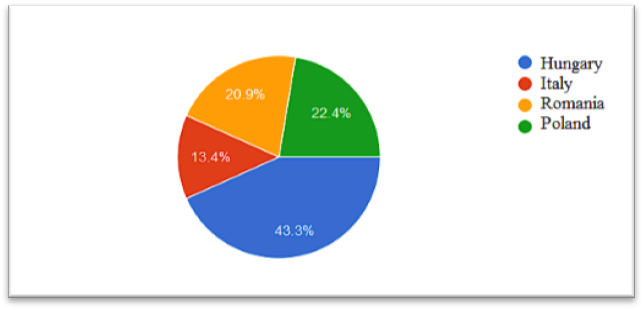
It is very important to us whether respondents realize the need to learn the basic cultural facts about other nations. 88% of them respond positively (Figure
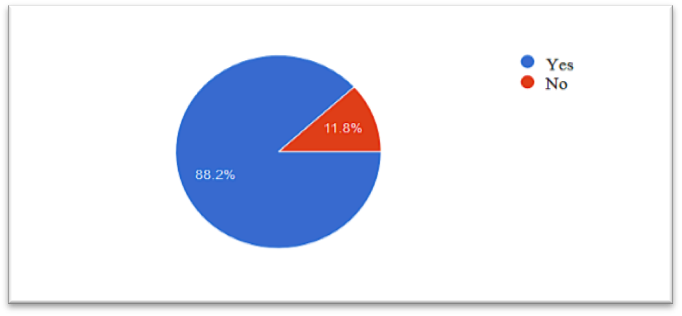
Since our idea is to use a Wiki system as an electronic platform of the project, the attitude and ability of students to use Wikipedia is important for us. More than 50% of respondents use Wikipedia as a resource of information, which supports our decision to base our platform on a Wiki system.
In order to achieve positive results from the project, it is important for us to understand when students rely on Wikipedia as an information resource. 95% of them use the encyclopedia to learn something new, 52% - to confirm their knowledge, 22% - when their teacher advises them to use it. These results once again show that students are able to work with a similar electronic platform (Figure
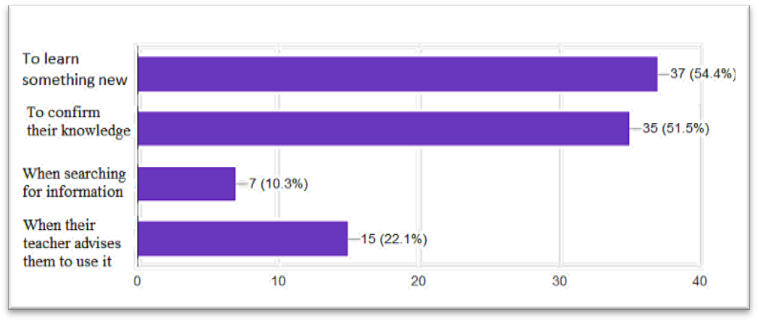
Respondents correctly understand the advantages of an encyclopedia dedicated to the culture of different nationalities and ethnic groups (Figure
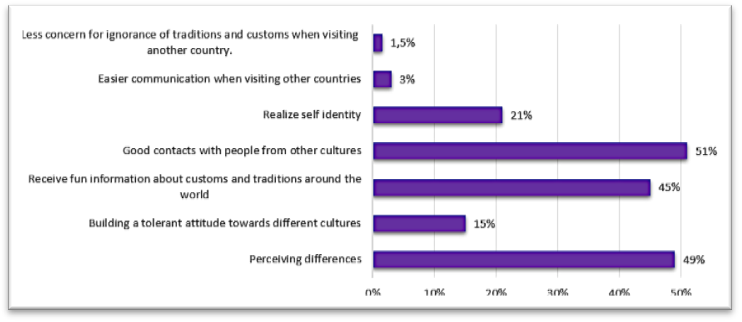
Students understand the importance of perceiving differences, determining their own identity, forming tolerant attitude toward different cultures. They realize that such knowledge will help them in intercultural communication. 72% of them believe that future teachers need to acquire knowledge and skills to work with people from different cultural communities.
Findings
The content of the Wiki system represents traditional emblems of culture of different nationalities and ethnicities, curious facts, specific for the certain ethnicity. The study of the conditions for the formation of intercultural competence includes the model of cultural space as a product and it is the basis of mutual understanding and tolerance. The system will deliver background knowledge about traditions divided into categories. Its content will be created and uploaded by students and teachers that make information accessible to more people and get publicity. Into the created technological model background knowledge about traditions divided into categories are delivered.
Creating technological mean brings training features and become an approach to create an e-platform for intercultural information where students and teachers can create pages dedicated to different cultural elements of different culture communities. Such a platform has a future since its usage will be open to the public and will acquire Life-Long Learning features. Each Wiki system is a manifestation of collective intelligence because users can create, enrich and change the flow of national-cultural information in open, free and informal groups where the knowledge is shared, edited and validated by all people who have visited the system (Raman, Ryan, & Olfman, 2005). Implementing this content mean is a meaningful way for evaluation our own identity and understand the cultural differences in the communication process. The work with Wiki systems is an awareness tool that can provoke a desire for creativity, showing and sharing the specifics of their own culture.
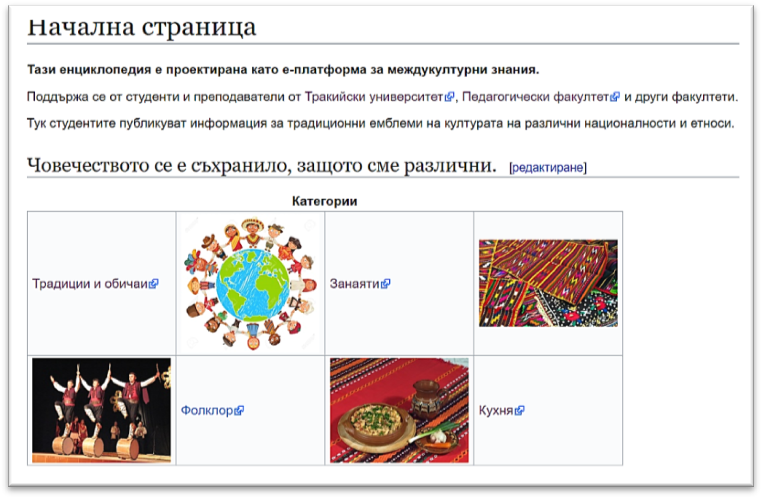
The benefits of Wiki systems can be summarized as follows: as encyclopedias they are repositories of shared knowledge; contain flexible and dynamic content; offer an easy access and simple language for content manipulation (Wikipedia, MediaWiki) (Figure
For the current project Wiki Media is implemented. (MediaWiki) The main advantage of this system is that it is a Free Open source Wiki package used by original Wikipedia. The system uses PhP language to manipulate and display content that is retrieved from SQL like database. Users create pages in Wiki text format and there is no need to program or coding.
Conclusion
During the research we found that in a pedagogical practice there is a need to form and develop an intercultural competence of students and teachers. The existing approaches of getting knowledge about different cultures and ethnic groups give results, but possibilities, that have been not explored yet, are revealed. They are aimed to emancipation of the pedagogical relations among the subjects of the educational process, reorientation to the personality of the students and formation of their ability to acquire knowledge autonomously. Digital technologies provide rich opportunities for interactive intercultural dialogue based on the knowledge of the cultural heritage of other nations. The digital space, that we have developed, supposes an awareness of cultural facts, which takes into account the value of the uniqueness of each individual, his mentality and national specificities. Our electronic system is aimed at achieving tolerant intercultural communication, which requires the existence of a bilateral/ multilateral code, bilateral/multilateral knowledge of customs and traditions. This is the line of overcoming tension when two or more cultures meet.
The developed platform is designed to support new users’ roles. Students and teachers are creators, editors and users of the electronic system. They can create intercultural content, exchange it with others, change and replace the old materials. The system is open and can be expanded, the content has dynamic character and is a product of collective intelligence. The electronic system has a sustainable use in educational and social aspect. In the long term, the platform will become a tool for the development of intercultural competence of students and teachers.
References
- Cohen, L., Manion, L., & Morrison, K. (2002). Research methods in education. Routledge.
- Hua, Z. (2016). Identifying research paradigms. Research methods in intercultural communication: A practical guide, 1-22.
- Moran, P. R., & Lu, Z. (2001). Teaching culture: Perspectives in practice. Boston, MA: Heinle & Heinle.
- Raman, M., Ryan, T., & Olfman, L. (2005). Designing knowledge management systems for teaching and learning with wiki technology. Journal of Information Systems Education, 16(3), 311.
- Spencer-Oatey, H., & Franklin, P. (2009). Intercultural interaction: A multidisciplinary approach to intercultural communication. Springer.
Copyright information

This work is licensed under a Creative Commons Attribution-NonCommercial-NoDerivatives 4.0 International License.
About this article
Publication Date
05 September 2018
Article Doi
eBook ISBN
978-1-80296-044-0
Publisher
Future Academy
Volume
45
Print ISBN (optional)
-
Edition Number
1st Edition
Pages
1-993
Subjects
Teacher training, teacher, teaching skills, teaching techniques
Cite this article as:
Tsenkova, A. K., Yordanova, L. K., & Kirykova, G. (2018). Intercultural Competence Of A New Type Teacher. In R. Valeeva (Ed.), Teacher Education - IFTE 2018, vol 45. European Proceedings of Social and Behavioural Sciences (pp. 685-692). Future Academy. https://doi.org/10.15405/epsbs.2018.09.80

